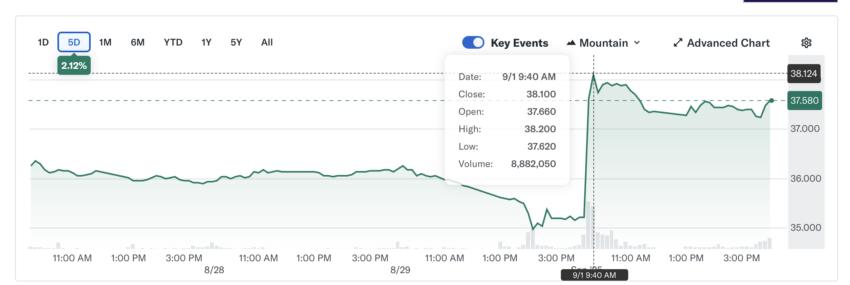Shares of Hong Kong-listed Bank of China rose 6.7% on Monday to close at HK$37,580, after local reports said the bank’s unit in the city is preparing to apply for a stablecoin license. The move comes just weeks after Hong Kong launched one of the world’s first licensing frameworks for fiat-backed stablecoins on Aug. 1.
The development has fueled speculation that one of China's largest state-owned banks could issue its own stablecoin, potentially creating a commercial rival to the Beijing-controlled digital yuan.
Chinese banks move towards stablecoin applications
According to the Hong Kong Economic Journal, the Bank of China (Hong Kong) has set up a dedicated task force to explore the issuance of stablecoins and prepare application documents. The bank did not respond to a request for comment, but recently told investors that it is studying digital asset applications and related risk management.
Market analysts say the Bank of China would be one of the most important candidates, given its scale of operations and the government’s rollout of a digital yuan. Some observers believe a licensed Bank of China Token could provide a regulated, internationally accessible counterpart to the central bank’s CBDC.
 BOC Hong Kong stock performance YTD / Source: Google Finance
BOC Hong Kong stock performance YTD / Source: Google FinanceThe news sent BOC Hong Kong shares up 6.7% to close at HK$37,580. The stock has risen 50.62% YTD, underscoring the strong uptrend in investor confidence. The stock’s all-time high of HK$40,850, set in April 2018, is still just HK$3 away from a new high.
Hong Kong's New Legal Framework for Stablecoins and Global Expansion
Hong Kong’s new regulations require any entity issuing stablecoins in the city — or those linked to the Hong Kong dollar offshore — to obtain approval from the Hong Kong Monetary Authority (HKMA). Licensed issuers must follow strict reserve management rules, segregate customer funds, ensure parity, and comply with disclosure, auditing, and anti-money laundering requirements.
The HKMA began accepting expressions of interest on Aug. 1 and set a deadline for applications on Sept. 30. Officials said more than 40 companies, including Standard Chartered, Circle and Animoca Brands , had expressed interest. On Aug. 8, Animoca confirmed a joint venture with Standard Chartered Hong Kong and the HKT to pursue the city’s first license.
Chinese tech giants JD.com and Ant Group have also announced plans to seek stablecoin licenses overseas. JD.com founder Richard Liu said in June that the company aims to reduce cross-border payment costs through stablecoins, starting with corporate transactions before expanding to consumers. Vincent Chok, CEO of Hong Kong-based First Digital, highlighted efficiency as a driving force.
“Blockchain technology reduces settlement times and bypasses traditional banking intermediary fees. This opportunity is particularly evident in emerging markets, where stablecoins provide protection from currency fluctuations.” He added that regulation is driving adoption: “Current trends point to exponential growth over the next two to five years.”
Stablecoin Growth Attracts Investor Interest in Asia
Investor activity in Hong Kong’s digital assets sector has surged alongside the new licensing regime. In July, listed companies raised about $1.5 billion for stablecoin and blockchain projects. OSL — one of the city’s largest licensed digital asset platforms — raised $300 million through a share offering backed by sovereign wealth funds and hedge funds.
An industry index tracking stablecoin-related stocks has surged more than 60% this year, outperforming the Hang Seng Index. Bank of China’s surge underscores the strong appetite but also highlights the volatility that regulators have repeatedly warned about.
However, in mid-August, Hong Kong's SFC and HKMA warned that strong market volatility related to licensing rumors could mislead investors, calling for vigilance.
Analysts note that Hong Kong’s strict regime could spur the rise of non-USD stablecoins in Asia, offering alternatives to the dollar in regional trade and payments.
Japan is preparing to approve its first yen Peg Token later this year, while China is reportedly exploring yuan-backed stablecoins to complement its digital yuan. In South Korea , financial authorities are also studying won-backed stablecoin initiatives.
At this stage, the HKMA has not issued any licenses. Investors are encouraged to verify the issuer's information through official channels, as regulators have asserted that mere rumours will not translate into approval.





